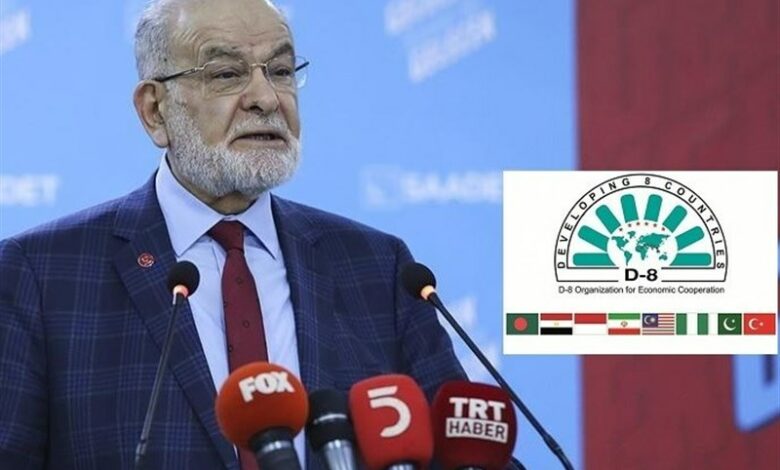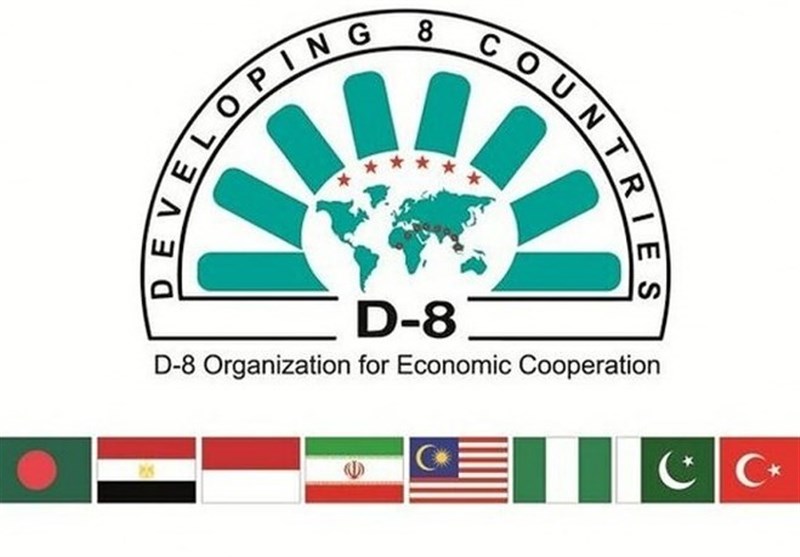Erbakan’s students wanted to revive “D8”.

| The Islamic Saadat Party of Turkey has announced that nowadays and considering what is happening in Gaza, the Islamic world needs a powerful institution like "D8" more than anything else. |
According to the international group Tasnim news agency, in a situation where only a few days from the coup anniversary of the year In 1997 Turkey, the students of the late Najmuddin Arbakan wanted to revive “D8” and considered its reactivation necessary for Turkey and the region. For what is happening in Gaza, the Islamic world needs a powerful institution like “D8” more than anything.
Tamel Karameloglu, the leader of the Saadat party and one of the old students of the late Prime Minister Erbakan of Islamism, who was ordered by the generals of the coup And Laik Turkey was dismissed in 1997, harshly criticizing Erdogan and declaring: “22 years have passed since the Justice and Development Party came to power and Erdogan has not been willing to talk about Day 8 even once. Why do you think our master founded D8 organization? If that organization was revived, would the Zionists be able to massacre Muslim children so easily?” Uploaded/Image/1402/12/14/1402121412361983729542974.jpg”/>
The leader of Saadat Party continued: “The Middle East is burning. The main perpetrator and perpetrator of this crime is the Zionist regime. According to our late teacher Mr. Arbakan, he only understands the language of force. It is not right for our country to do business with Israel in this bitter situation and to only express sympathy in the case of Gaza. This is the day when we feel the emptiness and absence of the D-8 organization. Now it’s time for the leaders of the D-8 countries to gather and take a common and decisive position against Israel.” Arbakan and the idea of 8 cooperation Muslim developing country
On June 28, 1996, President Suleyman Demirel entrusted the task of forming the government to Najmuddin Erbakan, and he, after an agreement with Chiller, formed the Refah Yule government.
The English newspaper The İndependent published the news of Erbakan’s appointment as prime minister under the headline “Return of the Ottoman Empire”. On August 19, 1375, Prime Minister Arbakan made his first foreign trip to Iran and conveyed the message that cooperation with Iran is of vital importance for Turkey.
He then visited Pakistan, Singapore, Malaysia and visited Indonesia. During this trip, agreements were made with Iran in the field of natural gas, oil and energy cooperation. These visits actually laid the foundations for D-8. Some time later, D-8 or eight developing countries was formed as an organization based on cooperation between Turkey, Iran, Bangladesh, Egypt, Indonesia, Malaysia, Nigeria and Pakistan. The official establishment of D-8 with The Istanbul Declaration was held at the summit on June 15, 1997 in Istanbul, and the Prime Minister of Turkey at the time, Prof. Nejmuddin Erbakan, was the main proponent of the establishment of this organization, and Hashemi Rafsanjani, the President of Iran at the time, also supported this idea.
This group, which was proposed as 8 countries in the first stage, planned to unite 20 countries and then 80 countries under its umbrella in the medium term.
It was supposed to be in D-8, each country The member should advance the area of responsibility and specific axis. These countries were supposed to develop trade with each other by producing their products and not become a tool of colonization of western countries.
In the first station, the following axes were defined for the 5 member countries:
Iran: effort In the way of producing science and achieving world-class technology.
Turkey: attention to modern industries and focus on health and environment.
Indonesia: fighting poverty, training human resources and attention to aerospace knowledge.
/> Malaysia: focus on finance, banking and privatization.
Nigeria: Becoming a great power in the field of energy.
Paying attention to the above axes shows that in defining these goals, the ability and potential of countries are also taken into account, and Iran has a special place in this group.
Day 8 was just the beginning…
A review of Erbakan’s ideas It shows that he had a special model for the unity of Islamic countries. He believed that since the European Union does not have an independent defense force, it is forced to maintain itself within the framework of NATO. Therefore, Islamic countries should also think about a military pact.
From Erbakan’s point of view, D-8 is not only an economic union, but it could be an organization in which the member states, according to political concepts and human rights and values spiritual, show special attention and focus on such axes: not war and welcome peace, supporting dialogue instead of conflict, supporting justice instead of double standards, inclusion of equality instead of discrimination and supremacy, freedom instead of colonialism and Human rights instead of domination and despotism. .jpg”/>
Revisiting the names of the members of the mentioned group such as Iran, Turkey, Pakistan, Bangladesh, Indonesia, Malaysia, Nigeria and Egypt, we remember the geographical extent, large population and the availability of raw materials and human resources of these countries. and the continuation of cooperation could bring great changes. Especially with the condition that the countries were supposed to use the barter trade method instead of the dollar and later, to create a common currency.
Why didn’t D-8 gather after Arbakan?
One of the dimensions The main difference between the Virtue Party Congress in 2001 and the separation of Abdullah Gul, Erdogan and others from their master Arbakan and the establishment of the Justice and Development Party was the issue of East and West. Gol and others believed that Erbakan’s special attention to the Islamic world, his return to the East and the adoption of rigid positions against the West and NATO have put Turkey in a difficult situation and it is necessary to stop this policy.
Gul, Erdoğan and their other comrades, who separated from Erbakan’s students and friends as the founders of the Justice and Development Party, believed that the 1997 coup was the domestic response of the secularists to Erbakan’s eastern axis thinking, and if that path continues, Turkey will Abroad also faces strong reactions, and instead of thinking about concepts such as the Islamic Ummah and the establishment of the Group of 8 Islamic Developing Countries, Turkey should express its commitment and adherence to friendship with the West and following the free market policy.
end of message/
| © | Webangah News Hub has translated this news from the source of Tasnim News Agency |



